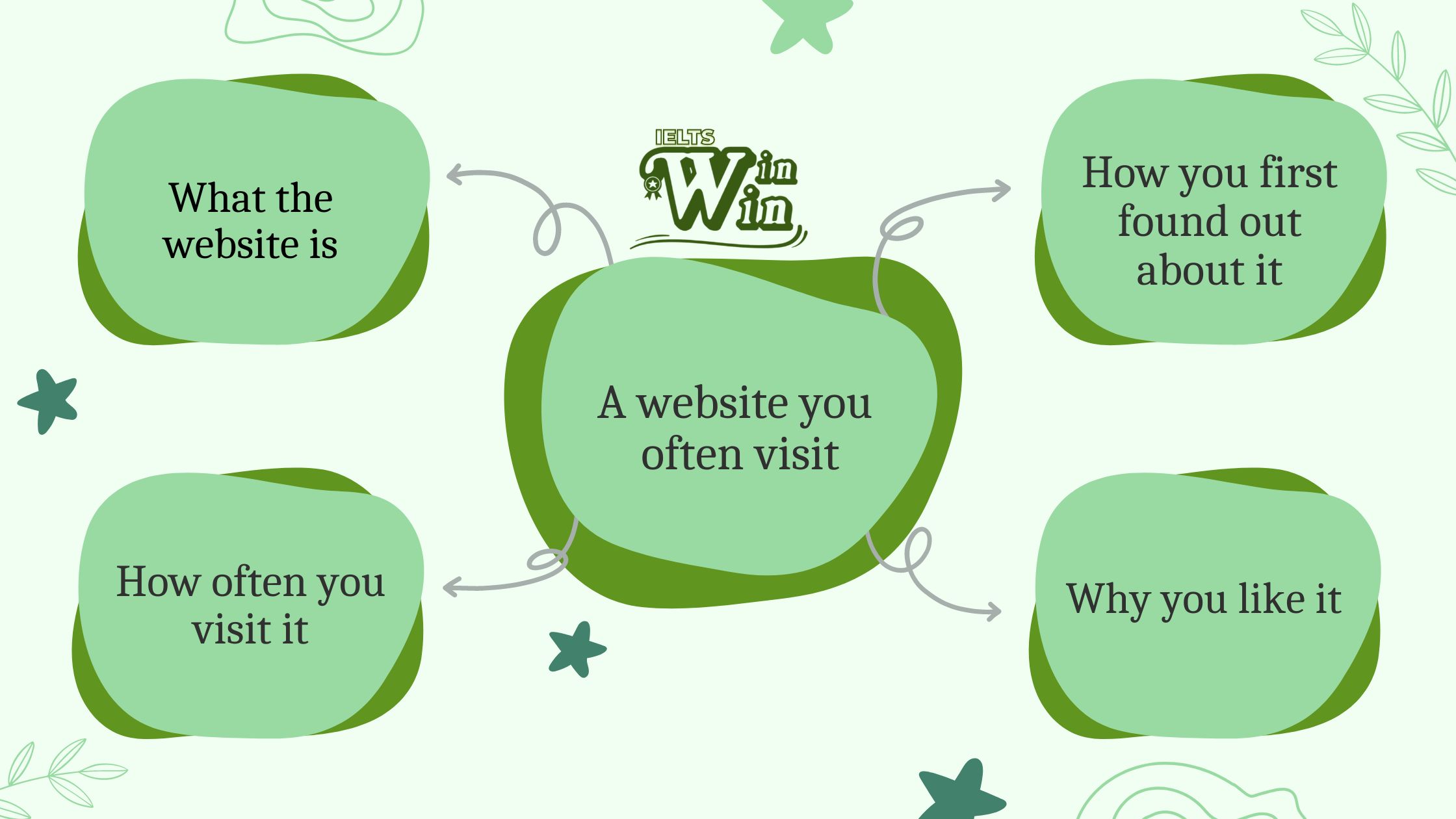✨Part 2: Describe a website you often visit.
You should say:
- what the website is
- how you first found out about it
- how often you visit it
- and explain why you like it
I must confess that Youtube has become my latest addiction. I visit the website every day without fail.
Originally designed for content creators to upload and monetise their videos, Youtube has become my go-to platform because of its vast library of eye-opening content. Whether it's travel vlogs for inspiration, educational videos for learning, or foreign shows for entertainment, there's always something to watch. I've discovered hidden gems in these videos and can't wait to visit these places someday. Also, I find some YouTubers to be inspirational due to their lifestyles, which I dream of having. I visit the website so frequently that I've lost count of how many times a day I access it. I typically browse it on my laptop or open the app on the TV so that my family can enjoy it with me. Youtube content creators earn money through ads, and while I want to support them, the frequent ads can be extremely bothersome. As soon as Youtube Premium became available in Vietnam, I subscribed without hesitation. Now, those interruptions vanish in an instant. This investment has been worth it because Youtube offers a window into diverse cultures and experiences that I wouldn't otherwise have access to, as well as useful lectures and tutorials that support my academic and professional growth.
I know Youtube is not a perfect platform, as some "trash videos” can slip through weak censorship. I hope that Youtube will become more diligent in its censorship efforts so that appropriate content can reach the right target audience.
- Latest: /ˈleɪtəst/ (adj) - mới nhất, gần đây nhất, mới nhất về công nghệ
- Monetise: /ˈmɑːnətaɪz/ (v) - thương mại hóa, kiếm tiền từ, tạo nguồn thu
- Inspiration: /ˌɪnspəˈreɪʃn/ (n) - cảm hứng, nguồn cảm hứng, động lực
- Discovered: /dɪˈskʌvərd/ (v) - khám phá, phát hiện, tìm ra
- Lifestyles: /ˈlaɪfstaɪlz/ (n) - lối sống, phong cách sống, thói quen sống
- Bothersome: /ˈbɑːðərsəm/ (adj) - phiền hà, làm phiền, khó chịu
- Subscribed: /səbˈskraɪbd/ (v) - đăng ký, đăng ký nhận tin, đăng ký sử dụng
- Interruptions: /ˌɪntəˈrʌpʃənz/ (n) - sự gián đoạn, sự ngắt quãng, sự cản trở
- Otherwise: /ˈʌðərwaɪz/ (adv) - nếu không, nếu không thì, nếu không như vậy
- Lectures: /ˈlektʃərz/ (n) - bài giảng, lời giảng, giảng đường
- Tutorials: /tuːˈtɔːriəlz/ (n) - hướng dẫn, bài học hướng dẫn, lớp học nhỏ
- Platform: /ˈplætfɔːrm/ (n) - nền tảng, nền tảng công nghệ, nền tảng truyền thông
- Censorship: /ˈsensərʃɪp/ (n) - sự kiểm duyệt, sự kiểm soát, sự kiểm duyệt truyền thông
- Appropriate: /əˈproʊpriət/ (adj) - thích hợp, phù hợp, đúng mực
PART 3
✨What effect has the Internet had on the way people generally communicate with each other?
The advent of the Internet has completely transformed the way we communicate, with unprecedented opportunities to connect with people regardless of their location. With the Internet, people can communicate through various means, such as emails, text messages, phone calls, and video conferencing. In addition, social media platforms like Facebook and Twitter enable people to share their thoughts, ideas, and experiences with audiences across the globe. While the Internet can certainly be tempting as a means of communication, it can also lead to a decrease in face-to-face interactions. This is because people may become accustomed to relying solely on digital communication and neglect opportunities for in-person interaction.
- Unprecedented: /ʌnˈpresɪdentɪd/ (adj) - chưa từng có, chưa từng xảy ra, không có tiền lệ
- Regardless: /rɪˈɡɑːrdləs/ (adv) - bất chấp, không quan tâm, không kể đến
- Communicate: /kəˈmjuːnɪkeɪt/ (v) - giao tiếp, truyền đạt thông tin, liên lạc
- Platforms: /ˈplætfɔːrmz/ (n) - các nền tảng, các sàn giao dịch, các môi trường
- Globe: /ɡloʊb/ (n) - quả địa cầu, toàn cầu, thế giới
- Face-to-face interactions: /feɪs tʊ feɪs ˌɪn.t̬ərˈæk.ʃənz/ (n) - sự tương tác trực tiếp, giao tiếp trực tiếp, đối thoại trực tiếp
- Accustomed: /əˈkʌstəmd/ (adj) - quen thuộc, đã quen với, thường xuyên làm gì đó
- Communication: /kəˌmjuːnɪˈkeɪʃn/ (n) - giao tiếp, truyền đạt thông tin, liên lạc
✨How do you think communicating by email is different from communicating by text message?
In general, emails are considered more formal and are typically used for professional communication, while text messages are seen as more casual and are often used for personal or informal communication. Emails are more sophisticated because composing an email requires the use of formal language and careful word choice, making them suitable for professional settings. On the other hand, text messages are typically shorter and more concise. When composing a text message, people can use any tone they want and even add emojis to express their feelings more clearly.
- Considered: /kənˈsɪdərd/ (adj) - được xem xét, được cân nhắc, được suy tính
- Communication: /kəˌmjuːnɪˈkeɪʃn/ (n) - giao tiếp, truyền đạt thông tin, liên lạc
- Sophisticated: /səˈfɪstɪkeɪtɪd/ (adj) - tinh vi, phức tạp, tinh xảo
- Suitable: /ˈsuːtəbl/ (adj) - thích hợp, phù hợp, đúng mực
✨Why do you think the Internet is being used more and more for communication?
The convenience and speed of communication that the Internet provides have made it increasingly popular among users. The ability to connect with others quickly, regardless of distance or time zone, is a major factor. Moreover, the Internet offers a variety of communication options, from making fast phone calls to sending short text messages, giving people more flexibility in how they communicate. Additionally, the Internet provides easy and quick access to information, allowing people to stay informed and up-to-date with the latest news and trends.
- Increasingly: /ɪnˈkriːsɪŋli/ (adv) - ngày càng, ngày một, dần dần
- Major: /ˈmeɪdʒər/ (adj) - chính, quan trọng, lớn
- Flexibility: /ˌfleksəˈbɪləti/ (n) - tính linh hoạt, sự dễ uốn, tính mềm dẻo
- Additionally: /əˈdɪʃənəli/ (adv) - thêm vào đó, ngoài ra, hơn nữa
- Up-to-date: /ˌʌptəˈdeɪt/ (adj) - cập nhật, mới nhất, hiện đại nhất
✨How can people find reliable information on the internet?
It can be challenging to distinguish reliable information from misleading or distorted information these days. What I always do is check the source first. Typically, trustworthy information comes from reputable sources, and credible authors often contribute to such sources. For instance, government websites or academic institutions where researchers and highly-academic individuals are the main authors are reliable sources. Also, to ensure the credibility of the information, cross-checking it with different sources that state and verify the same information, in the same way, is advisable.
- Reliable: /rɪˈlaɪəbl/ (adj) - đáng tin cậy, đáng tin
- Trustworthy: /ˈtrʌstwɜːrði/ (adj) - đáng tin cậy, đáng tin tưởng
- Institutions: /ˌɪnstɪˈtuːʃənz/ (n) - các tổ chức, các cơ quan, các viện
- Highly-academic: /ˌhaɪli əˈkædəmɪk/ (adj) - có tính chất học thuật cao, rất học thuật
- Cross-checking: /ˌkrɒs ˈtʃekɪŋ/ (n) - sự kiểm tra chéo, sự xác minh chéo
- Advisable: /ədˈvaɪzəbl/ (adj) - khuyến cáo, đáng lưu ý, đáng giới thiệu
✨Do you think the internet is safe for children to use unsupervised?
Absolutely not. While the Internet can provide children with valuable learning opportunities and exposure to the outside world, there are also risks involved. Without supervision from their parents or guardians, children can easily access inappropriate content that could negatively impact their development and awareness. In addition, the Internet is rife with scams, and children may be unaware of these dangers and could become victims of scammers. Therefore, it's essential to monitor and supervise children's online activities closely.
- Opportunities: /ˌɒpəˈtjuːnɪtiz/ (n) - cơ hội, thời cơ, định hướng
- Supervision: /ˌsuːpəˈvɪʒən/ (n) - sự giám sát, sự quản lý, sự điều hành
- Guardians: /ˈɡɑːdɪənz/ (n) - người bảo vệ, người giám hộ, người bảo trợ
- Negatively: /ˈneɡətɪvli/ (adv) - một cách tiêu cực, phủ định, không tốt
- Awareness: /əˈweənəs/ (n) - sự nhận thức, sự ý thức, sự hiểu biết
- Rife: /raɪf/ (adj) - phổ biến, lan tràn, thịnh hành
- Monitor: /ˈmɒnɪtər/ (v) - giám sát, theo dõi, kiểm soát
- Supervise: /ˈsuːpəvaɪz/ (v) - giám sát, quản lý, điều hành
Xem thêm các bài viết về Speaking Part 2 và 3 ở đây bạn nhé
Đừng ngần ngại để lại thông tin hoặc liên hệ với chúng mình qua địa chỉ sau đây để IELTS WinWin có thể hỗ trợ tốt nhất cho bạn nhé!
Địa chỉ: 118 Nguyễn Xuân Khoát, P. Tân Thành, Q. Tân Phú, TP. Hồ Chí Minh.
Fanpage: IELTS WinWin
Zalo: 0965 439 239 – 085 301 8788
Website: ieltswinwin.com



